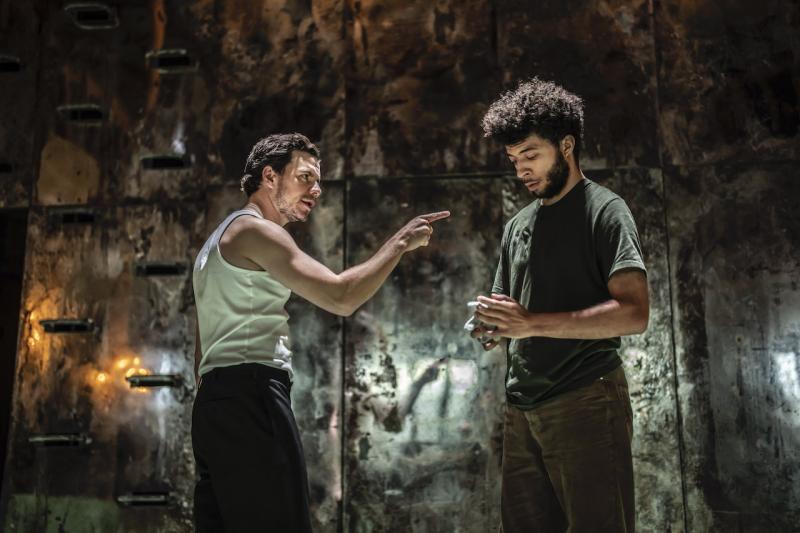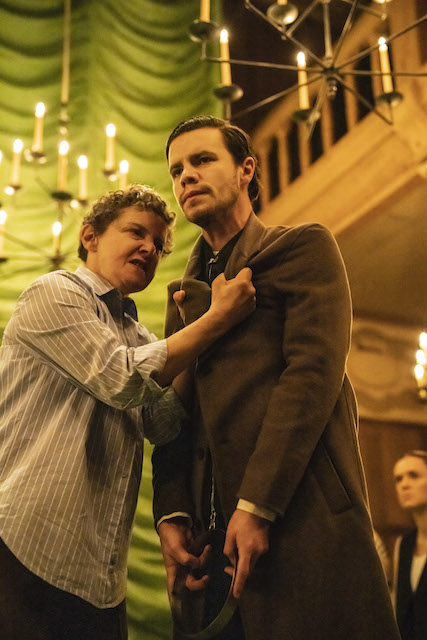Henry V, Shakespeare's Globe review - anatomy of a violent, murky world of leadership | reviews, news & interviews
Henry V, Shakespeare's Globe review - anatomy of a violent, murky world of leadership
Henry V, Shakespeare's Globe review - anatomy of a violent, murky world of leadership
The play is stripped down to expose sinister undercurrents of nationalism and honour-culture

It begins in darkness. All that can be heard is the sound of a human struggling painfully for breath so that even before the lights go up we have the sense of a life coming to an end. It’s a stark contrast to the triumphalism of the play’s original opening “Oh for a Muse of fire”.
In their final, bitter, conversation – taken from Henry IV part II – the old king delivers a warning about the grim realpolitik that enabled him to cling to power. “God knows, my son/By what by-paths and indirect crook’d ways/I met this crown; and myself know well/How troublesome it sat upon my head.” This is not the gilded account of being a monarch embraced by Laurence Olivier in 1944 but an anatomy of a murky, violent world of leadership. In this intelligent, clear-eyed staging – co-produced by the Globe with Headlong, Leeds Playhouse and Royal & Derngate – the play is stripped down to expose its sinister undercurrents of nationalism and honour-culture.
Oliver Johnstone’s Henry V is initially a humane presence. While he’s not the jokey anarchist who we’ve seen hanging out with Falstaff in Henry IV parts I and II, he is open and emotive, sobbing with grief when his father eventually does die. An early turning point is when he discovers that his close friend Scroop is conspiring with the French – where in the original he hands him over for execution, here he strangles him barehanded in front of us. We see how the violence nauseates him without removing his conviction that it’s necessary; he delivers the famous speech “imitate the action of a tiger” as a soliloquy, clutching his knees to his chest before rising to challenge himself in the tarnished mirror behind him.
 Holly Race Roughan’s slick, scabrous production adopts a deliberately simple layout. For the first half of the play the cast face each other from single rows of chairs on either side of the stage, announcing the scene number and their names as they get up to perform. Moi Tran’s minimalist set is initially a pale uniform green, but really comes into its own when the curtain rises up to reveal an atmospherically muted reflective backdrop. Climbing-holds across the surface enable cast members to scurry up and down the wall as they bicker and remonstrate with each other.
Holly Race Roughan’s slick, scabrous production adopts a deliberately simple layout. For the first half of the play the cast face each other from single rows of chairs on either side of the stage, announcing the scene number and their names as they get up to perform. Moi Tran’s minimalist set is initially a pale uniform green, but really comes into its own when the curtain rises up to reveal an atmospherically muted reflective backdrop. Climbing-holds across the surface enable cast members to scurry up and down the wall as they bicker and remonstrate with each other.
Britain of course has no shortage of issues with toxic nationalism, but one result of Cordelia Lynn’s deft edit of the script is that we hear echoes in Henry’s language of the more bloody nationalism being practised by Russia in Ukraine. In the famous siege of Harfleur he threatens that, “Your fathers [will be] taken by the silver beards,/And their most reverend heads dashed to the walls,/Your naked infants spitted on pikes,/Whilst the mad mothers with their howls confused/Do break the clouds”. You see the strain on his face – the hope that he will not have to follow through on his threat. Yet you can also see he will go ahead if he needs to, and in this, as indeed in his desire to reclaim territory based on defunct legal boundaries, he is no better than many subsequent dictators.
One of the most revelatory aspects of this production is what our new perception of Henry does to what’s normally staged as a “meet cute” with the King of France’s daughter – his future wife, Princess Katherine. In a performance that alternates between charm and raw anger, Joséphine Callies visibly manifests the distress she feels at being promised in marriage to a man who, far from being a hero to her, seems like a violent, irrational stranger. As a result the moment of the kiss comes across as a clear violation. The rewritten ending, in which she is interviewed by an immigration officer at England’s borders, compounds the sense of ignorance and brutality.
From a strong cast, stand outs include Dharmesh Patel – who shifts deftly between the treacherous Scroop, the comically cowardly Pistol and the deceptively courteous Montjoy – and Helena Lymbery (pictured above right) as a bitterly authoritative Henry IV. Max Pappenheim’s compositions and sound design powerfully heighten the sense of unease, ranging from individual trills played with wasp-like menace to discordant arrangements of the national anthem. The talented ensemble – which includes Lois Au on the bassoon, Benjin on the fascinatingly exotic nyckelharpa, Maddie Cutter on the cello and Joanna Levine on the bass viol – skilfully navigates the musical challenges while simultaneously dodging actors who’ve escaped into the pit. Azusa Ono’s tenebrous lighting design ramps up the feeling of introversion and disquiet.
This, then, is very much a Henry V for our times, a journey into the dark heart of what rampant nationalism can do even to honourable and well-intentioned individuals. It’s something of an antidote to the season’s prevailing bonhomie and tinsel, but this bold interpretation is well worth a visit from those interested in alternative histories and hidden motivations.
The future of Arts Journalism
You can stop theartsdesk.com closing!
We urgently need financing to survive. Our fundraising drive has thus far raised £49,000 but we need to reach £100,000 or we will be forced to close. Please contribute here: https://gofund.me/c3f6033d
And if you can forward this information to anyone who might assist, we’d be grateful.

Subscribe to theartsdesk.com
Thank you for continuing to read our work on theartsdesk.com. For unlimited access to every article in its entirety, including our archive of more than 15,000 pieces, we're asking for £5 per month or £40 per year. We feel it's a very good deal, and hope you do too.
To take a subscription now simply click here.
And if you're looking for that extra gift for a friend or family member, why not treat them to a theartsdesk.com gift subscription?
more Theatre
 Not Your Superwoman review – powerful tribute to the plight and perseverance of Black women
Golda Rosheuvel and Letitia Wright excel in a super new play
Not Your Superwoman review – powerful tribute to the plight and perseverance of Black women
Golda Rosheuvel and Letitia Wright excel in a super new play
 Cow | Deer, Royal Court review - paradox-rich account of non-human life
Experimental work about nature led by Katie Mitchell is both extraordinary and banal
Cow | Deer, Royal Court review - paradox-rich account of non-human life
Experimental work about nature led by Katie Mitchell is both extraordinary and banal
 Deaf Republic, Royal Court review - beautiful images, shame about the words
Staging of Ukrainian-American Ilya Kaminsky’s anti-war poems is too meta-theatrical
Deaf Republic, Royal Court review - beautiful images, shame about the words
Staging of Ukrainian-American Ilya Kaminsky’s anti-war poems is too meta-theatrical
 Laura Benanti: Nobody Cares, Underbelly Boulevard Soho review - Tony winner makes charming, cheeky London debut
Broadway's acclaimed Cinderella, Louise, and Amalia reaches Soho for a welcome one-night stand
Laura Benanti: Nobody Cares, Underbelly Boulevard Soho review - Tony winner makes charming, cheeky London debut
Broadway's acclaimed Cinderella, Louise, and Amalia reaches Soho for a welcome one-night stand
 The Pitchfork Disney, King's Head Theatre review - blazing with dark energy
Thrilling revival of Philip Ridley’s cult classic confirms its legendary status
The Pitchfork Disney, King's Head Theatre review - blazing with dark energy
Thrilling revival of Philip Ridley’s cult classic confirms its legendary status
 Born with Teeth, Wyndham's Theatre review - electric sparring match between Shakespeare and Marlowe
Rival Elizabethan playwrights in an up-to-the-minute encounter
Born with Teeth, Wyndham's Theatre review - electric sparring match between Shakespeare and Marlowe
Rival Elizabethan playwrights in an up-to-the-minute encounter
 Interview, Riverside Studios review - old media vs new in sparky scrap between generations
Robert Sean Leonard and Paten Hughes make worthy sparring partners
Interview, Riverside Studios review - old media vs new in sparky scrap between generations
Robert Sean Leonard and Paten Hughes make worthy sparring partners
 Fat Ham, RSC, Stratford review - it's Hamlet Jim, but not as we know it
An entertaining, positive and contemporary blast!
Fat Ham, RSC, Stratford review - it's Hamlet Jim, but not as we know it
An entertaining, positive and contemporary blast!
 Juniper Blood, Donmar Warehouse review - where ideas and ideals rule the roost
Mike Bartlett’s new state-of-the-agricultural-nation play is beautifully performed
Juniper Blood, Donmar Warehouse review - where ideas and ideals rule the roost
Mike Bartlett’s new state-of-the-agricultural-nation play is beautifully performed
 The Gathered Leaves, Park Theatre review - dated script lifted by nuanced characterisation
The actors skilfully evoke the claustrophobia of family members trying to fake togetherness
The Gathered Leaves, Park Theatre review - dated script lifted by nuanced characterisation
The actors skilfully evoke the claustrophobia of family members trying to fake togetherness
 As You Like It: A Radical Retelling, Edinburgh International Festival 2025 review - breathtakingly audacious, deeply shocking
A cunning ruse leaves audiences facing their own privilege and complicity in Cliff Cardinal's bold theatrical creation
As You Like It: A Radical Retelling, Edinburgh International Festival 2025 review - breathtakingly audacious, deeply shocking
A cunning ruse leaves audiences facing their own privilege and complicity in Cliff Cardinal's bold theatrical creation
 Edinburgh Fringe 2025 reviews: Refuse / Terry's / Sugar
A Ukrainian bin man, an unseen used car dealer and every daddy's dream twink in three contrasting Fringe shows
Edinburgh Fringe 2025 reviews: Refuse / Terry's / Sugar
A Ukrainian bin man, an unseen used car dealer and every daddy's dream twink in three contrasting Fringe shows

Add comment